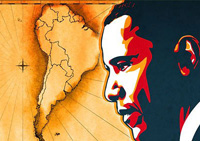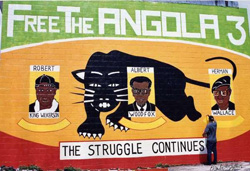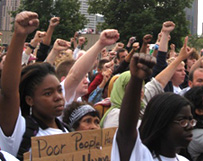
Archives

.jpg)
The Oily Road to 9/11
As troops and planes headed toward Afghanistan in October 2001, few people questioned the reasons for military engagement. But the causes of war are rarely simple and, as time has passed, other powerful motives have come into focus. As it turns out, the US war plan was in the works months before the 9/11 attacks.

Throwing Bullets at Failed Policies: US Plans For New Bases in Colombia
It was a winter day in the Argentine city of Bariloche when 12 South American presidents gathered there on August 28. It was so cold that Hugo Chavez wore a red scarf and Evo Morales put on a sweater. The presidents arrived at the Union of South American Nations (UNASUR) meeting to discuss a US plan to establish seven new military bases in Colombia. Though officials in Colombia and the US say the bases would be aimed at combating terrorism and the drug trade, US military and air force documents point to other objectives.

The Angola 3: Black Panther Political Prisoners in the US
Thirty seven years ago, deep in rural Louisiana, three young black men were silenced for trying to expose continued segregation, systematic corruption, and horrific abuse in the biggest prison in the US, an 18,000-acre former slave plantation called Angola. Peaceful, non-violent protest in the form of hunger and work strikes organized by inmates, caught the attention of Louisiana's first black elected legislators and local media in the early 1970s.

Grassroots Power and Non-Market Economies
There are primarily two factors behind the current spike in people's mobilization. One is the level of crisis that people around the world are facing, economically and environmentally. Second is the Internet, through which movements have been able to communicate and unite to a degree that is historically unprecedented. Some of the qualitative changes are, now there are people organized across many sectors that have never chosen to step out into the popular movement before.

The Virtues of Deglobalization
The current global downturn, the worst since the Great Depression 70 years ago, pounded the last nail into the coffin of globalization. Already beleaguered by evidence that showed global poverty and inequality increasing, even as most poor countries experienced little or no economic growth, globalization has been terminally discredited in the last two years. As the much-heralded process of financial and trade interdependence went into reverse, it became the transmission belt not of prosperity but of economic crisis and collapse.
